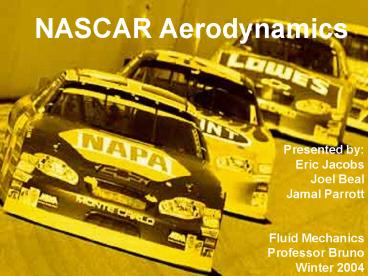NASCAR Aerodynamics
1 / 18
Title: NASCAR Aerodynamics
1
NASCAR Aerodynamics
Presented by Eric Jacobs Joel Beal Jamal
Parrott Fluid Mechanics Professor Bruno
Winter 2004
2
Introduction
- Purpose
- - Study the aerodynamic design of racecars
- Test Methods
- Pressure Distribution Tests (week 1)
- Lift and Drag Forces Tests (week 2)
- PIV (week 3)
- CFD Analysis (week 4)
3
Pressure Distribution Tests
- Why is pressure Important?
- -acts as a force on the car
- -lift and drag
Why is pressure Important? -acts as a force on
the car -lift and drag
Method -17 pressure taps centered over vehicle
surface
Method -17 pressure taps centered over vehicle
surface
4
Results
- Coefficient of Pressure used data to find Cp
Cp
5
Aerodynamic Forces On A Race Vehicle
- Drag Force
- - Drag is the force that acts opposite to the
path of the vehicles motion. - Lift Force
- - Lift force acts on a vehicle normal to the
road surface that the vehicle rides on.
6
Equations for Lift Drag
- Lift Coefficient
- Drag Coefficient
7
(No Transcript)
8
Results for Coefficient of Drag
Drag Coefficient vs. Velocity
- Fairly linear drag coefficient as velocity
varies - The average drag coefficient is 0.727
9
(No Transcript)
10
Results for Coefficient of Lift
Lift Coefficient vs. Velocity Constant lift
coefficient as velocity varies The average
lift coefficient is 0.091
11
Full Scale Application
- How is
Related to
- Used coefficients to
- non-dimensionalize
- equations
- High Reynolds Number
- Found Force, Lift and
- Pressure as function
- of size and velocity
12
Particle Image Velocimetry (PIV)
13
Computational Fluid Dynamics (CFD)
- 3D images describing Navier-Stokes equations
- Cost time effective
- Not as accurate as experimental results
- Model must converge
14
Comparison of PIV to CFD
- Point 1-8 compared
- CFDs different at points 6-8
- Converges but still not correct
15
CFD Velocity Results for Various Cars at 15hz
No spoiler less down force, faster air on top
of car Spoiler more turbulence and down force
at rear, increased wake Lees pressure at
front, object not streamline
NASCAR without spoiler
General Lees Charger without spoiler
NASCAR with spoiler
16
Enlarged Views of NASCAR rears
NASCAR model provided to us
NASCAR model altered (curvature on trunk lid)
17
Ideas For Improvement
- Stabilize body wheel movement
- Verify offset angle of car, test at different
known angles - Improve 3d model of car (include underside)
- Install moving ground in wind tunnel
- Repeat trials for increased accuracy
18
Final Thoughts Questions
For additional information please visit our
comprehensive website found at www.vu.union.edu/
jacobse/FluidsWeb/index.htm
- Thanks
- Joel Beal
- Eric Jacobs
- Jamal Parrott





























![⚡Read✔[PDF] NASCAR - Webster's Specialty Crossword Puzzles](https://s3.amazonaws.com/images.powershow.com/10061156.th0.jpg?_=20240621065)